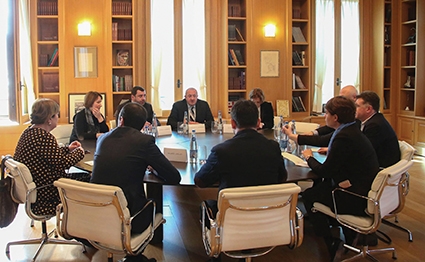President Holds Consultations over Surveillance Bill
Georgian President, Giorgi Margvelasvili, has held consultations over the surveillance draft bill adopted by parliament on March 1st and sent for his signature five days later.
Margvelashvili has time until March 21 to sign or veto the bill.
Discussions regarding the new bill on covert investigative actions were raised after the Constitutional Court of Georgia ruled on April 14, 2016 that the existing model of surveillance, with the Interior Ministry and Personal Data Protection Inspector as key players, needed to be changed.
The Court stated that the legislation allowing the police to have direct, unrestricted access to telecom operators’ networks to monitor communications was unconstitutional and set a deadline of March 31, 2017 to implement the court’s decision and replacing the existing surveillance regulations with new ones.
The final legislative package provides for the creation of a legal entity of public law (LEPL) the Operative-Technical Agency of Georgia, which will be responsible for covert surveillance. The Agency will be under the supervision of the State Security Service (SSS), however, the agency will be accountable to the Prime Minister and will submit a generalized report of its activities annually to the PM.
The responsibilities of the Agency will include: hidden surveillance of phone communication; retrieving information from computer systems; control of post office transfers; secret audio and video surveillance; and photographic surveillance.
The President invited all political parties, including the Georgian Dream (GD) majority, to take part in the discussions, however the ruling party has not yet officially responded to the proposal.
Margvelashvili and representatives of the Presidential Administration have already held a meeting with the representatives of the parliamentary minority Movement for Freedom-European Georgia and listened to their views and positions on the draft law for wiretapping.
The president also met with members of the opposition party United National Movement (UNM) on Tuesday. “We discussed two major problems of the draft law. First, how independent the newly established agency will be and how compatible it will be with the decision of the Constitutional Court. Second, that this law may impose an unjustified burden on businesses, because, as specified in the law, the agency uses businesses and in this case, the resources of the communication companies, without paying them,” the Parliamentary Secretary of the President of Georgia, Ana Dolidze, stated after the meeting.
On Wednesday the Presidential Administration met with the opposition Alliance of Patriots of Georgia (APG). All the opposition parties which took part in the consultations advised the president to veto the bill, saying it does not answer the verdict of the Constitutional Court and gives too much power to the SSS. Non-Governmental Organizations also share this position on the issue.
The majority sees no need for the presidential discussions, saying the bill has already been adopted by parliament and no amendments are necessary. However, they say they will make the final decision after the president’s decision.
If President Margvelashvili vetoes the bill, the majority will need votes of at least 76 MPs to override the veto. The ruling party has 116 MPs in the 150-seat parliament.
Thea Morrison












